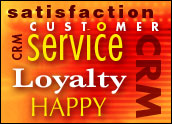
As more consumers and businesses turn to the Internet not just forinformation, but as a way to run their daily errands, the need for moresophisticated customer service grows unabated. The old one-two punch ofcall-center representatives and an online Frequently Asked Questions(FAQ) page does not satisfy customers who are increasinglytech-savvy and information hungry.
With that demand in mind, many companies are turning to firms that deliveronline self-service tools. Selling either in-house software or hosted services,sometimes even both, purveyors of self-service technology are findingtheir products are in high demand.
Can these companies finally bring the customer-service experience online?
Baby Grows Up
Customer service in some form has been part of e-commerce since onlineshoppers first began hitting the “Add to Cart” button. But efforts toaddress customer needs often fell short in the past, especially ifcustomers wanted specific information about products or personaldata such as account balances.
Several companies sprouted up to address this situation. Accordingto industry observers, ServiceWare and Primus Knowledge were the originalproviders, later joined by others including Kana, eGain, RightNow andParticipate Systems.
At first, these types of firms beefed up self-service by building robustknowledge banks that sometimes included natural language processing. Thistechnology enables a customer to ask a question, in the same way hewould ask a human rep, and get an answer online.
The knowledge banks are still heavily utilized, but they also have beenbolstered by other features, such as online communities and message boards.
Future Think
One important step forward is in the advancement of search functionality,according to Scott Schwartzman, COO of ServiceWare.
“It’s important for customers to be able to just type their questions,” hetold CRM Buyer. “For that to be effective, you also have to have away that the system can learn from questions it can’t answer.”
ServiceWare sells a product that is self-learning and self-organizing,Schwartzman said, and that delivers suggestions based on advancednatural language processing.
Knowledge Banking
Meanwhile, Participate Systems, which boasts customers like MercuryInteractive, Thomson, Logitech and TiVo, offers a knowledge bank with acommunity management system. Customers can interact with each other to solveproblems and share their experience.
Patrick Saeger, Mercury Interactive’s vice president of customer support,told the E-Commerce Times that use of the technology has resulted in morecustomer satisfaction. “What we try to do is use our site as a communicationchannel,” he said. “By doing this, we can translate that feedback to otherparts of the organization.
“You’re not just throwing out content and expecting customers tobe happy with that,” he added. “You have to continue to invest inthe system.”
Hello, ROI
Customer satisfaction is a compelling reason to implement self-service, but aneven more noticeable benefit is the return on investment (ROI). For example, Mercury Interactive has reduced the average cost per customer interaction by 25 percent. Forrester principal analyst John Ragsdale told CRM Buyer that this figure is not surprising and is a standard cost reduction with use of self-service technology.
Alan Warms, CEO of Participate Systems, said in an interview with CRM Buyer that his company often sees its clients save at least 20 percent per interaction. In certain industries, where customer support is most acute, use of self-service has been growing particularly quickly, he said.
Warms noted that the industries expressing the most interest are consumer electronics, technology, medical diagnostic and financial. “These are industries where the customer-service bar keeps getting raised,” he said. “They’re trying to deliver complex, sophisticated products, and their support needs to keep up with that.”
Customers of technology and consumer electronics may have an even keener interest in better online self-support in the future, he added. That is because as companies like Dell charge for their support services, customers will gravitate toward the free support offered online.
A Few Miles To Go
Even though self-service applications and services are gaining ground, however, the field still has some kinks to work out if it is to find future success.
Most notably, self-service must be able to integrate well with other parts of an organization. The strategy also has to be blended with call-center operations in a way that makes sense. Lastly, companies have to be able to adapt to changing customer-support needs with all parts of their customer management.
Karen Lound, customer support manager of self-service at Fourth Shift, told CRM Buyer that in a recent survey, 70 percent of Fourth Shift’s customers rated the knowledge bank as the most helpful aspect of customer service. On the other hand, an online message board, which was actually implemented at the suggestion of customers, has been a disappointment.
“It hasn’t gotten as much use as I thought it would,” she said. “But we’re working on changing that.”
Solid Road
Despite the adjustments companies may have to make, Ragsdale noted that bolstering self-service efforts is a good way to achieve good ROI and boost customer happiness — as long as it is done intelligently.
“You can’t just throw a site up and assume customers will come,” he said. “You have to find out what customers think and what they want. Certainly, the potential for cost-cutting is large with self-service, but you have to invest time and money into making sure you’re implementing something that makes sense.”
In certain industries, such as telecommunications and consumer technology, self-service will become a differentiator among competitors, he added.
“The use of self-service can be compelling,” Ragsdale said, “as long as the company is doing it right.”













































Social CRM
See all Social CRM